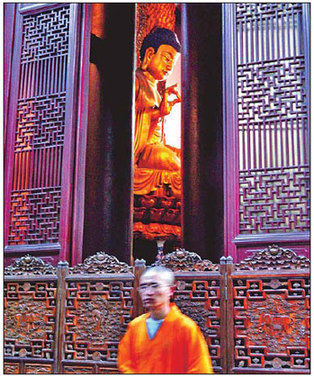Tips and Articles
Garden of delights
Updated: 2011-03-24 07:54
By Yan Yiqi (China Daily)
|
Lingyin Temple is Hangzhou's oldest Buddhist shrine. Wu Haisen / for China Daily |
2. Lingyin Temple
"Lingyin" means the "retreat of souls". The temple, about 2 km west of West Lake, is where people can feel totally relaxed.
Lining the road that leads to the temple, grand trees are like big umbrellas blocking the sunshine in summer.
Hidden between the mountains, the temple is believed to be the oldest Buddhist temple in Hangzhou, and receives more than 3 million visitors a year.
It is alright for non-Buddhists to visit the temple, because just listening to the rustling of tree leaves and the twittering of birds can make people forget the troubles of a busy city life.
3. Xixi Wetland
The 11.5 sq km wetland is the first of its kind in China, located 5 km west of West Lake. The characteristics of this park can be described as serene, wild, plain and elegant.
Ecology is the key word of Xixi Wetland. Endangered plants, birds, fish and frog species are well protected in it.
It is also representative of the culture of East China. Each building alongside the watercourse represents one typical cultural practice of this area. Visitors can sit inside the East China-styled houses listening to Zhejiang province's famous Yueju Opera.
4. Hefang Street
Hefang Street is where you can experience how it was when Hangzhou was the capital of China, and also shop and buy souvenirs.
The 1.8 km pedestrian street is decorated in ancient styles. The emperors' palace was once built beside it, making it the economic and political center of Hangzhou.
Most of the shops on the street have a history of more than 100 years. People can buy typical Hangzhou products here.
Do not be surprised if you see a person wearing an ancient costume walking on Hefang Street. It is a demonstration of how people in the past lived and visitors can also try on these clothes themselves and take pictures as a memoir of their visit.
5. Thousand Islands Lake
The lake lies in Chun'an county, about 150 km west of downtown Hangzhou. It is an artificial lake formed in 1959 as a result of the construction of Xin'an River Power Station. As its name suggests, the lake contains 1,078 islands, each having its own specialty.
The fact that the lake is artificial does not affect the natural beauty.
About 80 percent of the lake is covered with forests, so it is also considered to be a natural oxygen bar. Most of the islands can be visited and the strangely formed caves and fascinating stones have amazed millions of tourists.
Specials

Tea-ing up
More turning to Chinese tea for investment opportunities like vintage wine

A cut above
The ancient city of Luoyang is home to a treasure trove of cultural wonders.

Rise and shine
The Chinese solar energy industry is heating up following recent setbacks in the nuclear sector
